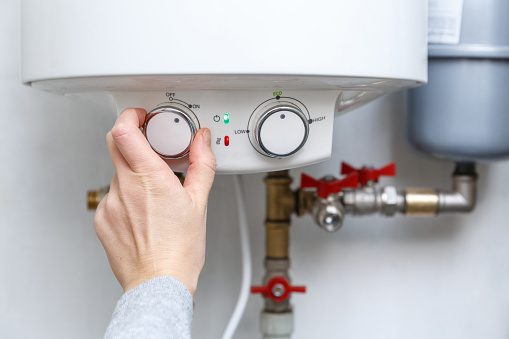During the cold Champaign winter, your home needs a heating system that’s reliable and effective. Even if you’re building a new home, the heater is an essential component your family relies on.
However, there are many choices when it comes to heating your home. Most homeowners in the Champaign area use a furnace to keep their homes warm. Furnaces are effective but require a network of air ducts to bring heat throughout the house. Heat pumps are another common choice that sometimes relies on a ventilation system. However, they can also be installed as a ductless system.
While furnaces and heat pumps are both forced-air heating systems, boilers operate in a different way. Instead, boilers use a process called radiant heating. Radiant heating involves heating up the objects in a room so that they send heat waves throughout the space. The objects a boiler heats include baseboard heaters, radiators, and in-floor piping.
How Does A Boiler System Work?
Boiler systems work by heating water and distributing heat through a radiator. The boiler converts water to hot water or steam, which moves through the pipes into radiators to disperse heat within a home.
While this process is ongoing, the water is simultaneously redirected back to the boiler, recycled, and reheated again. A network of pipes is installed below the floor of each room in the home so that each room can receive heat. After the thermostat activates the boiler, it starts running water through a heat exchanger. As the hot water flows through the pipes into the radiators and pipes, the heat radiates upwards and throughout the rooms.
Types of Boiler Heating Systems
At Castle Home Comfort, we specialize in every type of boiler installation. However, it’s essential that you understand what options there are. As your best local installation team, we’ll help you choose the most efficient and effective system for your home.
Steam Boiler
Steam boilers heat water to create steam. Then, the steam is pumped through the radiators, and the cooled condensation is recycled back into the boiler for reheating.
Hot Water Boiler
Hot water boilers heat up water and then pump it into the radiators or baseboards throughout the home.
Natural Gas Boiler
Natural gas boilers heat coils inside the boiler and transfer the heat into the water inside the tank.
Electric Boiler
Electric boilers offer an environmentally friendly heating solution with no exhaust fumes. In addition, electric boiler installation is more affordable than other options, and these boilers are quieter and more space-efficient.
Oil Boiler
Oil boilers are water-based heating systems fueled by oil. Typically seen in rural areas that don’t have as much access to natural gas, oil boilers heat the water inside the tank and distribute it through the piping in the home.
Condensing Boiler
Condensing boilers use two different heat exchangers. One of them heats the water before it’s distributed to the radiators, and the other one reheats the recycled water.
7 Reasons Why Boilers Are Beneficial
Boilers offer many benefits, including:
1. Energy Efficiency
Although boilers are more costly to install than furnaces, they provide monthly savings on your energy bill. Boilers are more energy-efficient than furnaces and cost less to run. Water is more effective for transferring heat than air is, which is one-way boilers that allow you to save energy and money.
Since boilers can last up to three decades with proper maintenance, this can result in thousands of dollars of energy savings.
2. Durability and Longevity
Compared to furnaces or heat pumps, boilers have a much longer lifespan. The circulator pump is the only major moving mechanical component inside a boiler. On the other hand, furnaces and heat pumps use a blower fan and multiple motors to function.
Since boilers only use one major mechanical component, they sustain less strain while functioning. In fact, heat pumps and furnaces have an average lifespan of 10 to 20 years, while boilers can last up to 30 years if maintained by your local HVAC professionals.
3. Low Maintenance
As stated, boilers have many fewer moving parts than forced-air systems such as heat pumps or furnaces. For this reason, they require a lot less maintenance as well. However, it’s still important to include your boiler in your annual maintenance checks.
Although boilers encounter fewer repair issues, an annual inspection will prevent significant issues from arising.
For instance, hiring your local HVAC experts once a year to inspect the heating and cooling systems around your home is the best way to keep your systems functioning. This way, you can conduct a boiler repair if necessary to ensure your indoor air quality is pristine.
Furthermore, a quick boiler inspection will ensure that it doesn’t suffer from scaling, a condition that can occur when the pH level of the water in your system isn’t at a neutral 7.
4. Even Heat Distribution
In addition to all of the benefits above, boilers also provide a more even distribution of heat around your home. Homeowners who use forced-air heating in their homes often face an issue where the heated air accumulates at the top of the room. When this happens, it takes some time for the air to heat up the entire space properly.
However, boilers offer better heat distribution because of the radiant heat emitted from boiler systems. This heat starts on the floor and moves evenly throughout a room, making your home more comfortable. Furthermore, heated floors are a luxury during the cold Illinois winters.
5. Indoor Air Quality
In terms of the quality of the air in your home, boilers offer a clean and safe solution. Forced air-distribution systems such as furnaces require ductwork that leads throughout the entire house. When the ductwork is compromised or contaminated, the ducts will begin distributing pollutants to each room in the home.
Furthermore, it’s not uncommon for furnaces to cause dry air within the home while also stimulating dust and dirt throughout the house. On the other hand, boilers radiate heat out from a radiator into the air that’s already in the home. As such, no new air that could potentially be filled with dust, mold, or dirt will enter the home.
Thanks to this design, boilers offer cleaner and more reliable air than forced-air distribution systems.
6. Heating Controls
The majority of modern boilers come with intuitive heating controls. These include TRVs and room thermostats that allow you to adjust the temperature in each specific room.
Each unique TRV turns off the radiator when the air around the valve reaches the set temperature. This design means you won’t have to monitor and change each thermostat continuously. Furthermore, you may also be able to use learning thermostats and dedicated mobile applications to control the boiler from outside the home.
7. Compact and Quiet
If you’ve ever lived with an older boiler or a conventional heating system, you probably understand that they aren’t exactly quiet. However, modern boiler systems are much more silent and compact. In fact, boilers can fit seamlessly into most areas in your home without compromising your available space.
Boiler Installation Services in Champaign, IL
With over four decades of experience, Castle Home Comfort is here to help with your boiler installation or boiler repair. Servicing Champaign, IL, and the surrounding area, we’ll ensure you get the right system for your home.
Our goal is to conduct a boiler installation that provides energy efficiency, healthy indoor air quality, and a comfortable home environment. If you need a new heating system for your home, call Castle Home Comfort today. We’re available 24 hours a day, seven days a week, to get you the help you deserve.

